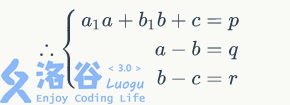1
2
3
4
5
6
7
8
9
10
11
12
13
14
15
16
17
18
19
20
21
22
23
24
25
26
27
28
29
30
31
32
33
34
35
36
37
38
39
40
41
42
43
44
45
46
47
48
49
50
51
52
53
54
55
56
57
58
59
60
61
62
63
64
65
66
67
68
69
| #include<bits/stdc++.h>
#define RG register
#define clear(x, y) memset(x, y, sizeof(x));
using namespace std;
inline int read()
{
int data=0, w=1;
char ch=getchar();
while(ch!='-'&&(ch<'0'||ch>'9')) ch=getchar();
if(ch=='-') w=-1, ch=getchar();
while(ch>='0'&&ch<='9') data=(data<<3)+(data<<1)+(ch^48), ch=getchar();
return data*w;
}
const int maxn(1010), maxm(10010);
struct edge { int next, to, dis; } e[maxm << 2];
int head[maxn], e_num, n, ML, DL, a, b, c, dis[maxn], cnt[maxn];
bool inque[maxn];
inline void add_edge(int from, int to, int dis)
{
e[++e_num]=(edge){head[from], to, dis};
head[from]=e_num;
}
queue<int> q;
inline int spfa()
{
inque[1]=cnt[1]=1; dis[1]=0;
q.push(1);
while(!q.empty())
{
int x=q.front(); q.pop();
if(cnt[x]>=n) return -1;
for(RG int i=head[x];i;i=e[i].next)
{
int to=e[i].to;
if(dis[x]+e[i].dis<dis[to])
{
dis[to]=dis[x]+e[i].dis;
if(!inque[to])
{
inque[to]=true; ++cnt[to];
if(cnt[to]>=n) return -1;
q.push(to);
}
}
}
inque[x]=false;
}
return dis[n]^dis[0]?dis[n]:-2;
}
int main()
{
clear(dis, 63); n=read(); ML=read(); DL=read();
for(RG int i=1;i<=ML;i++)
{
a=read(); b=read(); c=read();
add_edge(a, b, c);
}
for(RG int i=1;i<=DL;i++)
{
a=read(); b=read(); c=read();
add_edge(b, a, -c);
}
printf("%d\n", spfa());
return 0;
}
|
